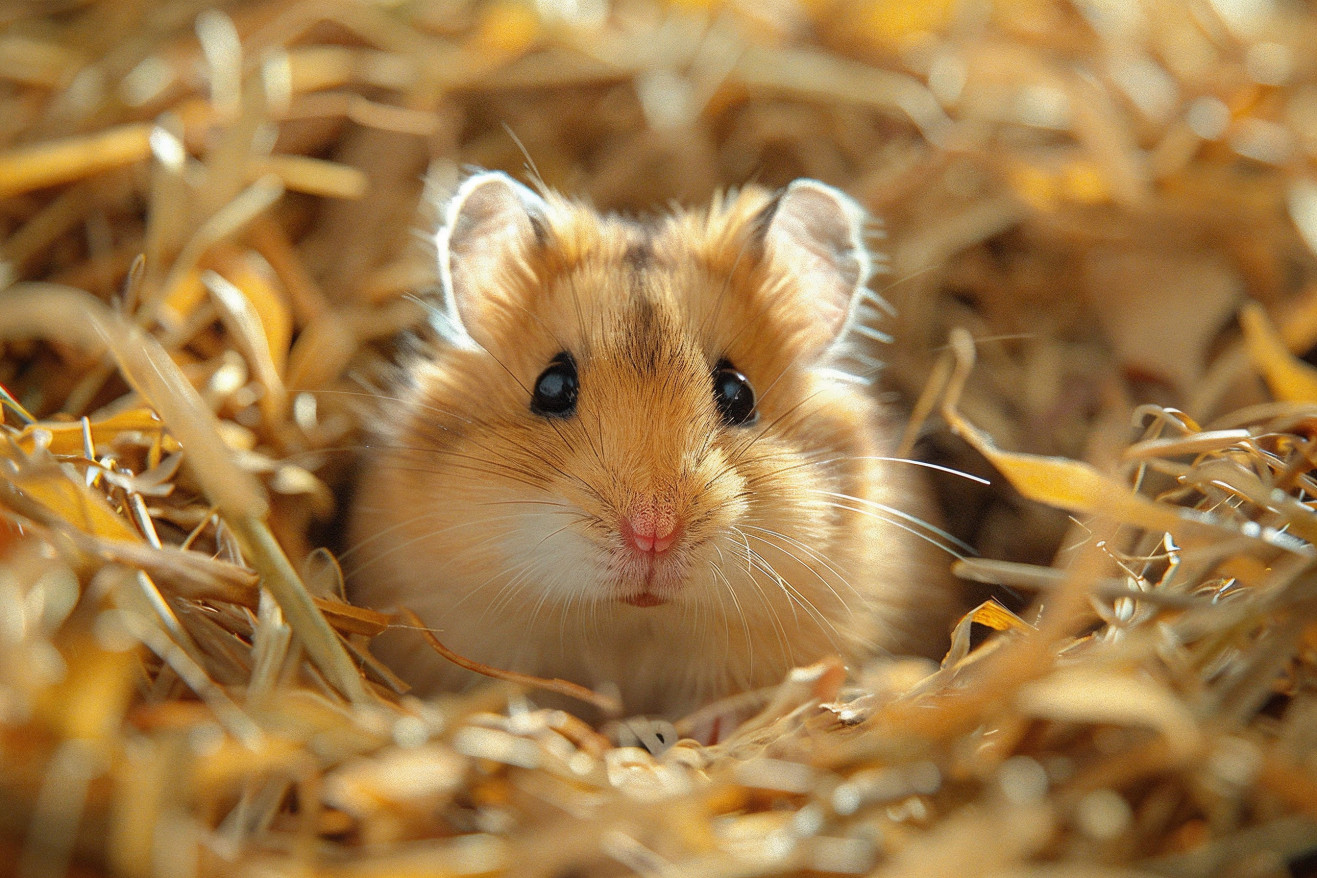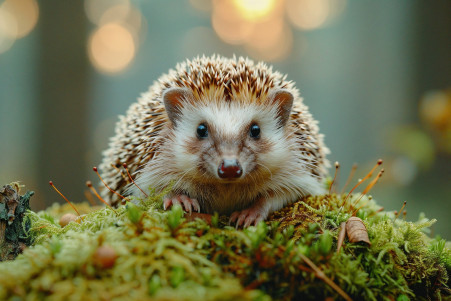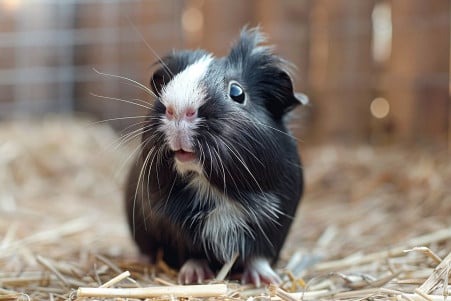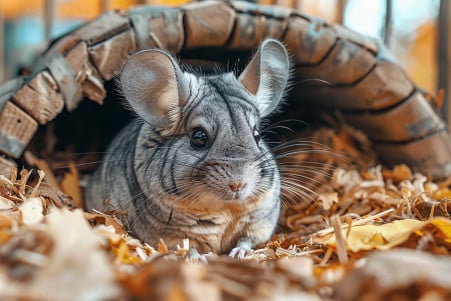Do Hamsters Smell? Exploring Odor and Pet Care
16 April 2024 • Updated 15 April 2024

If you're thinking about getting a hamster, you may have one important question on your mind – do hamsters smell? While hamsters themselves are not particularly smelly animals, the waste they produce can lead to some odors in their living space. That said, most people will find that they can keep the smell of their hamster's habitat under control with regular cleaning.
In this article, we'll take a look at the studies by animal scientists and veterinarians that have investigated the many factors that contribute to the smell of hamsters. This will include looking at everything from their biology and behavior to the type of bedding and cages they are kept in. By learning more about the causes of hamster smell, you can make a more informed choice and set up the best possible home for your new furry friend.
Do Hamsters Smell?
Hamster Scent Glands and Odor Sources
Male and female hamsters have scent glands that are most active after reaching sexual maturity. In a study in Physiology & Behavior, the researchers noted that the glands produce a musky scent that is stronger in males and is used for territorial marking. Meanwhile, a study in the Journal of Comparative Psychology showed that female hamsters produce even more pungent scents when they are in estrus to attract potential mates.
The glands are located on the flanks and become most prominent after hamsters reach sexual maturity, according to the Veterinary Practice News. While the scents are important for communication and mating, the buildup of these scents with hamster urine and feces can cause unpleasant odors for pet owners. Regular cleaning and maintenance of the habitat is important for keeping odors under control, although some muskiness is normal for these animals.
How to Clean a Hamster Cage and Control Odors
In addition to using the right products, it’s important to clean your hamster’s cage regularly to keep odors at bay. According to Hamster Central, this includes daily spot cleaning to remove soiled bedding and waste. In addition, make sure your hamster’s cage is well-ventilated to ensure proper air flow and prevent odors from building up.
If you’re dealing with particularly strong odors, you may want to invest in a cage cleaner that contains enzymes. According to Biocide Systems, these cleaners work by breaking down organic matter at its source, which eliminates odors without the need for extensive rinsing.
In addition to using an enzyme-based cleaner, Pets on Mom.com suggests that you may want to consider using a litter box or setting up a designated bathroom area for your hamster to help contain urine odors. This will make it easier to spot clean your hamster’s cage and prevent odors from spreading throughout the entire enclosure.
By combining daily spot cleaning, proper ventilation, and the use of enzyme-based cleaners, you can keep odors under control and ensure that your hamster’s cage is a pleasant place for your pet to live.
What to Look for in Hamster Bedding
The best hamster bedding is absorbent, nontoxic, and odor-reducing, according to The Dodo. Victoria Raechel, a hamster enthusiast, says that "Dust and how bedding compacts and holds up when burrowed in are both tied to your hamster's safety and should also be considered when shopping for bedding."
Paper-based bedding is recommended by many experts and is known to be an effective option for controlling odors. HamsterWelfare.com explains that paper bedding can help absorb urine and ammonia smells. Meanwhile, aspen shavings and hemp bedding are also safe and help reduce odors, the website says.
On the other hand, PetAssure cautions against pine and cedar shavings, which can lead to respiratory problems and make odors worse. It also advises against scented bedding, which can stress hamsters and cover up odors instead of getting rid of them.
By choosing absorbent, unscented bedding like paper, aspen, or hemp, hamster owners can keep odors under control and make sure their pet has a clean, healthy living environment.
How to Deal With Male Hamster Smells
Male hamsters have stronger smelling pheromones than females, which is a result of their larger scent glands and increased marking behaviors, according to a study in Physiology & Behavior. While the musky odors produced by these glands are a way for male hamsters to mark their territory, they can also lead to unpleasant smells in their cages.
To help manage the stronger smells produced by male hamsters, it can be helpful to make sure they have a larger cage with plenty of absorbent bedding, as suggested by Aroma Care Solutions, to help dilute and contain the smells. In addition, regular cleaning of the scent gland area and spot cleaning of urine can help minimize the impact of male-specific odors.
Neutering male hamsters can also be an option to help reduce their scent marking and the smells that come with it, but this is something that should be discussed with a vet before moving forward. In addition, as mentioned by HealthyChildren.org, it's important to make sure you're keeping your hamster's cage clean to prevent the accumulation of dried urine, feces, and other waste that can lead to smells in the air.
How to Bathe a Hamster: A Step-By-Step Guide
Hamsters are clean animals and don’t need to be bathed in water. In fact, as wikiHow notes, bathing a hamster in water can remove the natural oils from their skin and fur, which can cause a variety of health problems. The site even says that "bathing your hamster will cause it stress, which can lower its immune system" and that you should "always double check with your vet before bathing your pet."
If you absolutely must bathe your hamster, for example, if they’ve come into contact with something sticky or toxic, Pet Lovers Centre recommends using a damp toothbrush or washcloth and warm water. It’s important to make sure no water gets in your hamster’s ears or eyes. The site also suggests offering a sand bath or chinchilla dust bath instead, which will allow your hamster to groom itself and keep its coat clean and healthy.
As PetMD notes, hamsters "do not typically enjoy or need a traditional bath," but many will enjoy sand baths. These baths help remove natural oils and dirt without the risks of a water bath. You can offer a small dish of appropriate sand in your hamster’s enclosure, which will enable them to roll, dig, and bathe in it just like they would in the wild.
Conclusion: How to Keep Your Hamster's Home Smelling Fresh
While hamsters don't naturally smell, there are a few things that can cause them to develop an odor. However, with the right care and maintenance, you can keep these odors to a minimum.
One of the biggest causes of hamster odor is the scent glands. These glands produce a musky smell, particularly in male hamsters, and are used for a variety of purposes, including marking territory and communicating with other hamsters. In addition, hamster urine and feces can also cause the cage to smell if it's not cleaned regularly.
To keep odors to a minimum, it's important to clean the cage regularly. This includes daily spot cleaning and weekly deep cleaning. In addition, using a well-ventilated cage, as well as an enzyme-based cleaner, can help keep odors to a minimum. Finally, using the right type of bedding, such as paper or aspen, can also help.
Male hamsters tend to smell more than females because their scent glands are larger. However, there are several things you can do to keep their smell to a minimum, including providing a larger cage, cleaning the scent gland regularly, and even neutering.
While hamsters don't need to be bathed in water, which can be stressful for them, they do need to be able to take a sand or dust bath. This will help them keep their fur clean and healthy.
By understanding the causes of hamster odor and taking the right steps to keep it to a minimum, you can ensure that your hamster's home is a pleasant place for both of you.


